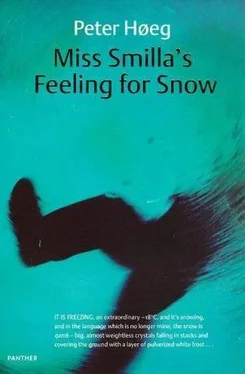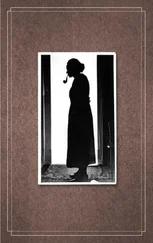Peter Høeg - Smilla's Sense of Snow aka Miss Smilla's Feeling for Snow
Здесь есть возможность читать онлайн «Peter Høeg - Smilla's Sense of Snow aka Miss Smilla's Feeling for Snow» весь текст электронной книги совершенно бесплатно (целиком полную версию без сокращений). В некоторых случаях можно слушать аудио, скачать через торрент в формате fb2 и присутствует краткое содержание. Жанр: Современная проза, на английском языке. Описание произведения, (предисловие) а так же отзывы посетителей доступны на портале библиотеки ЛибКат.
- Название:Smilla's Sense of Snow aka Miss Smilla's Feeling for Snow
- Автор:
- Жанр:
- Год:неизвестен
- ISBN:нет данных
- Рейтинг книги:3 / 5. Голосов: 1
-
Избранное:Добавить в избранное
- Отзывы:
-
Ваша оценка:
- 60
- 1
- 2
- 3
- 4
- 5
Smilla's Sense of Snow aka Miss Smilla's Feeling for Snow: краткое содержание, описание и аннотация
Предлагаем к чтению аннотацию, описание, краткое содержание или предисловие (зависит от того, что написал сам автор книги «Smilla's Sense of Snow aka Miss Smilla's Feeling for Snow»). Если вы не нашли необходимую информацию о книге — напишите в комментариях, мы постараемся отыскать её.
Smilla's Sense of Snow aka Miss Smilla's Feeling for Snow — читать онлайн бесплатно полную книгу (весь текст) целиком
Ниже представлен текст книги, разбитый по страницам. Система сохранения места последней прочитанной страницы, позволяет с удобством читать онлайн бесплатно книгу «Smilla's Sense of Snow aka Miss Smilla's Feeling for Snow», без необходимости каждый раз заново искать на чём Вы остановились. Поставьте закладку, и сможете в любой момент перейти на страницу, на которой закончили чтение.
Интервал:
Закладка:
It's apparent in the rigidity of his back, in the way he tries to keep watch over everything, to be everywhere at once. In the discipline he maintains.
"Is there anything you… need on board?"
The question doesn't come to him naturally. He's not a welfare worker or a personnel director. He's a man who gives orders.
I move up behind him. "A key."
"You have a key."
I'm so close that I can breathe on the back of his neck. He doesn't turn around.
"To the boat deck."
"It's been confiscated."
His bitterness lashes at me, at my request. But mostly at the fact that they've taken away his omnipotence as the commander in chief of the ship.
Then I ask him the question that Jakkelsen asked me. "Where are we headed?"
His finger jabs at the sea chart at his side. It's a map of South Greenland. Over it a clear plastic facsimile has been placed of lines, circles, cross-hatching, and inky black triangles of the transmitter at Julianehab, indicating ice concentrations, the visibility, and the position of icebergs. A course has been marked out north along the coast, around Cape Thorvaldsen, and then north by northwest. The course stops near Vestland, at a spot in the middle of the ocean.
"That's all I know."
He hates them for this. For keeping him on a short leash like an infant.
"But the western ice stretches south to Holsteinsborg. And it's no picnic. A little north of Søndre Strømfjord. That's as far as they'll get me to take them."
I've sat down next to Jakkelsen. Fernanda and Maria are sitting on the other side of the table. They've permanently joined forces against the male world surrounding them.
They ignore me, as if they were rehearsing for the way it will be when, quite soon, I no longer exist.
Jakkelsen is staring at his plate. His bunch of keys is lying on the table next to him. I put down my knife and fork, stretch, put my right hand on his keys, move them slowly across the table, and let them drop into my lap. Under the shelter of the table edge I move them through my fingers, one by one, until I find the key marked with three Ks and a seven. It's the standard utility key on the Kronos; I have one myself. But Jakkelsen's also has an H. The ship was repaired in Hamburg. The H stands for Hauptschliissel, a passkey. I twist it off the key ring. Then I put the rest of the keys back on the table and stand up. Jakkelsen hasn't moved.
In my cabin, I put on warm clothes. Then I go out on the quarterdeck.
I saunter along with my hand on the sea rail. It's supposed to look as if I'm taking a stroll.
In North Greenland distances are measured in sinik, in "sleeps," the number of overnights that a journey requires. It's not a fixed distance, because the number of sinik can vary, depending on the weather and the time of year. It's not a measurement of time, either. Under the threat of a storm, I've traveled with my mother non-stop from Force Bay to Iita, a distance that should have taken two overnights.
Sinik is not a distance, not a number of days or hours. It is both a spatial and a temporal phenomenon, a concept of space-time that describes the union of space and motion and time that is taken for granted by Inuits but that cannot be captured by ordinary speech in any European language.
The European measurement of distance, the standard meter in Paris, is quite different. It's a concept for reshapers, for those whose primary view of the world is that it must be transformed. Engineers, military strategists, prophets. And mapmakers. Like me.
The European system of measurement didn't really become part of me until I took a course in surveying at Denmark's Technical College in the fall of 1983. We surveyed the Deer Park. With theodolites and tape measures and normal distribution and equidistances and stochastic variables and rainy weather and little pencils that had to be sharpened constantly. And we paced off areas. We had a teacher who repeated over and over that the alpha and omega of surveying is that the geodesist must know the length of his own stride.
I knew my own pace measured in sinik. I knew that when we ran behind the sled because the sky was black with pent-up explosions, the space-time around us would be half the number of sinik required when we let the dogs pull us over smooth new ice. In fog the number would double, in a snowstorm it might be tenfold.
In the Deer Park I translated my sinik into feet. Ever since, no matter whether I'm walking in my sleep or secured to a line, whether I'm wearing boots and crampons or a tight skirt that forces me to shuffle along two inches at a time, I've always known exactly how much distance I'm covering when I take a step.
I'm not taking this stroll on the quarterdeck for fun. I'm measuring the Kronos. I'm gazing out across the water, but all of my energy is focused on remembering the measurements.
I saunter eighty feet past the mast farthest astern and its two winches, down to the aft superstructure. Forty feet along the superstructure. At the railing I lean over and estimate the height of the freeboard to be sixteen feet.
Someone is standing behind me. I turn around. Hansen fills the doorway to the metal shop. Massive, wearing huge, wooden-soled boots. In his hand he's holding what looks like a short dagger.
He regards me with that indolent, brutal satisfaction that physical superiority makes some men feel.
He raises his knife. Then he puts his left hand up to the blade and, with a circular motion, starts polishing it with a little rag. It leaves a white soapy film on the blade. "Viennese chalk. You have to polish them with Viennese chalk. Or they won't hold an edge."
He doesn't look at the knife. His eyes are fixed on me as he talks.
"I make them myself. Out of old cold chisels. The hardest steel in the world. First I set the edge with a diamond wheel. Then I polish it with carborundum and oilstone. Finally I polish it with Viennese chalk. Very, very sharp."
"Sharp as a razor?"
"Sharper," he says with satisfaction.
"With a point like a nail file?"
"Much more pointed."
"Why is it then," I ask, "that you're in such desperate need of a shave, and you show up in the galley that I've just cleaned with such incredibly filthy nails?"
He glances up toward the bridge and then back at me. He licks his lips. But he can't come up with an answer. Isn't this an example of history repeating itself? Hasn't Europe always tried to empty out its sewers in the colonies? Isn't the Kronos a repeat of the prisoners on their way to Australia, the foreign legion off to Korea, and British commandos going to Indonesia?
Back in my cabin I take out the two folded pieces of paper that I've been carrying in my jacket pocket. I've stopped leaving anything important in my cabin. While I remember them, I record the numbers I've paced off onto the sketch I'm in the process of drawing of the Kronos's hull. In the margin I write down the other figures; some I know, the others I guess at.
Overall length: 345 feet Length p.p.: 318 feet Height of upper decks: 31 feet Height of second deck: 20 feet; Cargo capacity (second deck): 100,000 cubic feet Cargo capacity (in hull): 125,000 cubic feet Total: 225,000 cubic feet
Speed: 18 knots, comparable to 4,500 BHK Diesel consumption: 14 tons per day Range: 10,000 nautical miles
I look for an explanation for the restrictions that have been placed on the movements of the Kronos's crew. When the Inuit Hans sailed with Peary to the North Pole, the sailors were not allowed on the officers' deck. It was part of the exercise, an attempt to bring along the security of a feudal hierarchy to the Arctic. On ships today the crew is too small for these types of regulations. And yet they exist on the Kronos.
I start the washing machines. Then I leave the laundry room.
When you're part of an isolated group of peoplewhether in a boarding school, on the polar ice cap, or on a ship-your individuality dissolves and is partially replaced by a sense of unity. Unconsciously, at any given moment, I can place everyone else in the universe of the ship. By their footsteps in the corridor, by their breathing when they're asleep behind closed doors, by their whistling, the rhythm of their work, and my knowledge of their work shifts.
Читать дальшеИнтервал:
Закладка:
Похожие книги на «Smilla's Sense of Snow aka Miss Smilla's Feeling for Snow»
Представляем Вашему вниманию похожие книги на «Smilla's Sense of Snow aka Miss Smilla's Feeling for Snow» списком для выбора. Мы отобрали схожую по названию и смыслу литературу в надежде предоставить читателям больше вариантов отыскать новые, интересные, ещё непрочитанные произведения.
Обсуждение, отзывы о книге «Smilla's Sense of Snow aka Miss Smilla's Feeling for Snow» и просто собственные мнения читателей. Оставьте ваши комментарии, напишите, что Вы думаете о произведении, его смысле или главных героях. Укажите что конкретно понравилось, а что нет, и почему Вы так считаете.




![Рута Шепетис - Ashes in the Snow [aka Between Shades of Gray]](/books/414915/ruta-shepetis-ashes-in-the-snow-aka-between-shades-thumb.webp)







